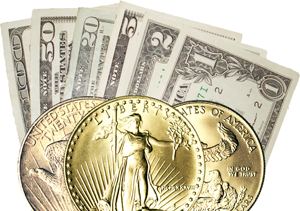 Times of economic crisis often spark debate about what went wrong and what could be done to improve the situation. Some individuals, often pejoratively referred to as “gold bugs“, believe that the best way to stabilize the U.S. economy is to return to a gold standard. Although this view is not exactly widespread among economists, vocal proponents such as Ron Paul, Jim Grant and Steve Forbes have bolstered popular support by bringing this debate back into the spotlight.
Times of economic crisis often spark debate about what went wrong and what could be done to improve the situation. Some individuals, often pejoratively referred to as “gold bugs“, believe that the best way to stabilize the U.S. economy is to return to a gold standard. Although this view is not exactly widespread among economists, vocal proponents such as Ron Paul, Jim Grant and Steve Forbes have bolstered popular support by bringing this debate back into the spotlight.
The Gold Standard: A Brief History
Interestingly, the U.S. has never been able to hold onto a gold standard for any continuous length of time, but rather has a history of shifting between fiat currency and precious metals. After the Revolutionary War, for instance, the “Continentals” printed to finance the war became worthless; prompting Congress to establish only gold and silver as legal tender. Gold, however, held greater value.
The high cost of the Civil War created economic turmoil that threatened U.S. gold reserves. Banks began to suspend note payments in gold, while the government issued a form of legal tender commonly known as “greenbacks.” Although the value of these “greenbacks” floated during this period, this was not a fiat currency because the government had promised to fully redeem them in gold. Redemption did not fully come to pass until 1879.
The Gold Standard Act of 1900 made gold the sole backing behind the U.S. dollar, but this relationship was short-lived. The Great Depression prompted President Roosevelt to take drastic steps to boost the economy. The Gold Reserve Act of 1934 nationalized U.S. gold reserves, giving the Federal Reserve the power to devalue the dollar and print more currency. Private citizens could no longer buy gold for investment purposes, though gold certificates began to circulate again in 1964. The gold standard did not officially end, however, until 1971, when President Nixon ended direct conversions between the U.S. dollar and gold.
Reasons to Return to a Gold Standard
Those who support a gold standard offer many reasons for doing so, but here are four of the most important ones:
1. Reduced Government Spending
Even supporters of fiat currency are alarmed by the crushing amount of debt saddling the U.S. economy. Since the government can print as much money as it wants, little can be done to stop excessive spending. A gold standard, however, limits printed currency to the amount of gold held in reserve, significantly reducing credit available to the government.
2. Price Stability
Promoters of a gold standard also believe that it leads to longer price stability when compared to the fluctuating values under fiat currency. Since the amount of gold produced each year is relatively small, the amount of available money would grow slowly. Prices would remain steady except during periods when a large gold rush causes its value to drop, though these events are much rarer than inflationary periods.
3. Preservation of Savings
Those who buy gold today do this to preserve their savings against the ravages of inflation. Unlike fiat currency, gold retains its purchasing power because it is a tangible asset that has retained its value for thousands of years. A gold standard, then, would extend this value to the entire monetary system.
4. Fixed Exchange Rates
A gold standard, if adopted worldwide, could lead to fixed exchange rates and reduce the amount of uncertainty that plagues international trade. For example, if the value of U.S. exports surpasses its imports, then gold would flow into the country and cause inflation. Since the world’s supply of gold is limited, this means that U.S. trading partners would experience deflation from lowered gold supplies, and would thus become more competitive by exporting cheaper goods. This flow mechanism would thus equalize the value of goods across the board.
The Gold Standard and War
These reasons indicate that a gold standard could add a level of stability that the world economy desperately needs. A study of the gold standard throughout history, however, reveals that during times of war, the balance of trade becomes heavily disrupted, leading nations to engage in inflationary spending to pay off their debts and suffer from a rash of bank runs that severely deplete their gold reserves. Those in support of a gold standard, then, would need to find a solution to this problem.
